Table of Contents
MBBS in Russia - Introduction
MBBS in Russia: Choosing to study medicine is dignified and demanding. Russia has become a popular destination for international students pursuing an affordable yet high-quality MBBS education. This guide offers comprehensive information to aid in decision-making, covering the unique blend of traditional and modern medical knowledge in Russia and providing insights into the advantages and challenges of pursuing an MBBS in the country.
Why Choose Russia for MBBS?
Choosing to study MBBS in Russia offers several compelling advantages that have made it an increasingly popular choice for international students. Let’s explore these benefits in detail.
1) Quality Education
Russian medical universities are renowned for their high standards of education. Many of these institutions have a long history dating back centuries, during which they have refined their teaching methodologies and research capabilities. The medical curriculum in Russia is comprehensive and up-to-date with the latest advancements in medical science.
Key points:
- Rigorous academic standards
- Well-established medical schools with rich histories
- A curriculum that combines traditional knowledge with modern medical practices
- Global Recognition
Many Russian medical universities are recognized by international bodies such as the World Health Organization (WHO), UNESCO, and the Medical Council of India (MCI). This global recognition ensures that your degree will be valued in many countries around the world.
Key points:
- Degrees recognized by WHO and other international organizations
- Opportunity to practice medicine globally
- Easier process for license acquisition in many countries
2) Affordability
The cost of medical education in Russia is significantly lower compared to Western countries. This affordability doesn’t come at the expense of quality, making it an excellent option for students seeking high-quality education on a budget.
Key points:
- Lower tuition fees compared to Western countries
- Affordable living costs
- Value for money in terms of education quality
3) English-Medium Programs
Many Russian universities offer MBBS programs in English, eliminating language barriers for international students. This allows students to focus on their studies without the added pressure of learning a new language immediately.
Key points:
- Option to study entirely in English
- No need to be fluent in Russian to begin your studies
- Gradual introduction to the Russian language alongside medical studies
4) Cultural Experience
Studying in Russia provides a rich cultural experience. As one of the largest countries in the world, Russia offers diverse landscapes, historical sites, and a unique blend of Eastern and Western cultures.
Key points:
- Exposure to Russian art, literature, and history
- Opportunity to learn a new language
- Experience of living in a different cultural context
5) Advanced Medical Facilities
Russian medical universities are equipped with state-of-the-art facilities and laboratories. Students have access to modern equipment and technologies used in medical practice and research.
Key points:
- Hands-on experience with advanced medical equipment
- Well-equipped laboratories for practical learning
- Exposure to modern medical technologies
6) Research Opportunities
Russia has a strong tradition of medical research. Many universities offer opportunities for students to engage in research projects, providing valuable experience for those interested in academic medicine or specialization.
Key points:
- Chance to participate in cutting-edge medical research
- Opportunities to publish in international journals
- Exposure to diverse areas of medical specialization
7) Diverse Patient Exposure
Studying in Russia allows students to interact with a diverse patient population and provides exposure to a wide range of medical conditions and treatment approaches.
Key points:
- Experience in treating diverse patient demographics
- Exposure to both common and rare medical conditions
- Understanding of different cultural approaches to healthcare
By choosing to study MBBS in Russia, you’re not just gaining a medical degree; you’re embarking on a journey that will broaden your horizons, challenge you academically, and prepare you for a successful career in medicine on a global stage.
Reasons to Why MBBS In Russia Choose Russia for MBBS
1. Popularity | It has become very popular, and around 30 of the world’s top 100 universities, are from Russia. |
2. High Education standards | The education standards there are also very high. The medical universities of Russia have around a 7:1 teacher-student ratio. it means there is one teacher for seven students. |
3. Easy admission process | They have an easy admission process, |
4. Friendly environment | Plus, in a very friendly environment, you can adjust easily to Russia |
NMC guidelines | ✔️ |
English medium course | ✔️ |
WAO-listed | ✔️ |
Recommended Universities for MBBS in Russia
When considering MBBS programs in Russia, it’s important to note that the course typically spans six years. Russia is vast, and your choice of university can significantly impact your experience.
There are 55 universities across the country, and discussing all of them can be overwhelming. Therefore, let’s begin with some excellent options that are budget-friendly, and then we can gradually explore higher-budget alternatives.
1. Tver State Medical University
- Location: Tver, Russia
- Key Features
- Established: 1936
- Teaching Medium: English
- Course Duration: 6 years
- Recognition: WHO, NMC, WDOMS
- Annual Intake: 500+ international students
Faculty Strength: 400+ experienced professors
- Overview: Tver State Medical University (TSMU), established in 1936, stands as one of Russia’s premier medical institutions. Located in the historic city of Tver, approximately 180 kilometers from Moscow, the university has built a strong reputation for excellence in medical education over its 85+ years of existence.
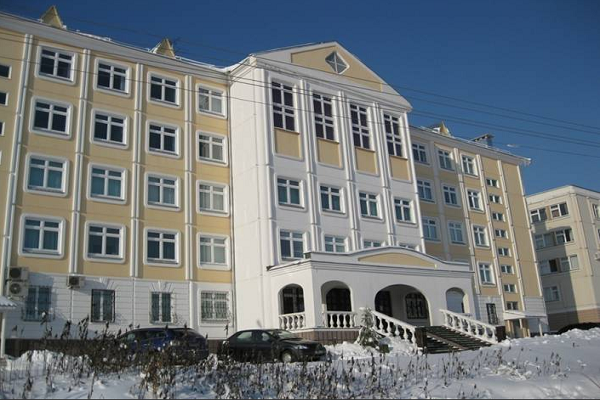
2. Petrograd State Medical University
- Location: Saint Petersburg, Russia
Key Features & Academic Excellence
- Ranked among top 3 medical universities in Russia
- WHO and NMC recognized
- English-medium instruction available
- 98% graduate success rate
- 6-year MBBS program duration
Faculty & Expertise
- 1000+ highly qualified professors
- 200+ doctorate degree holders
- International visiting faculty
- Regular faculty development programs
- Overview: This prestigious institution combines historical excellence with modern medical education, making it a premier choice for international medical students. Its comprehensive facilities, experienced faculty, and strong emphasis on practical training create an ideal environment for developing skilled medical professionals ready for global healthcare challenges.
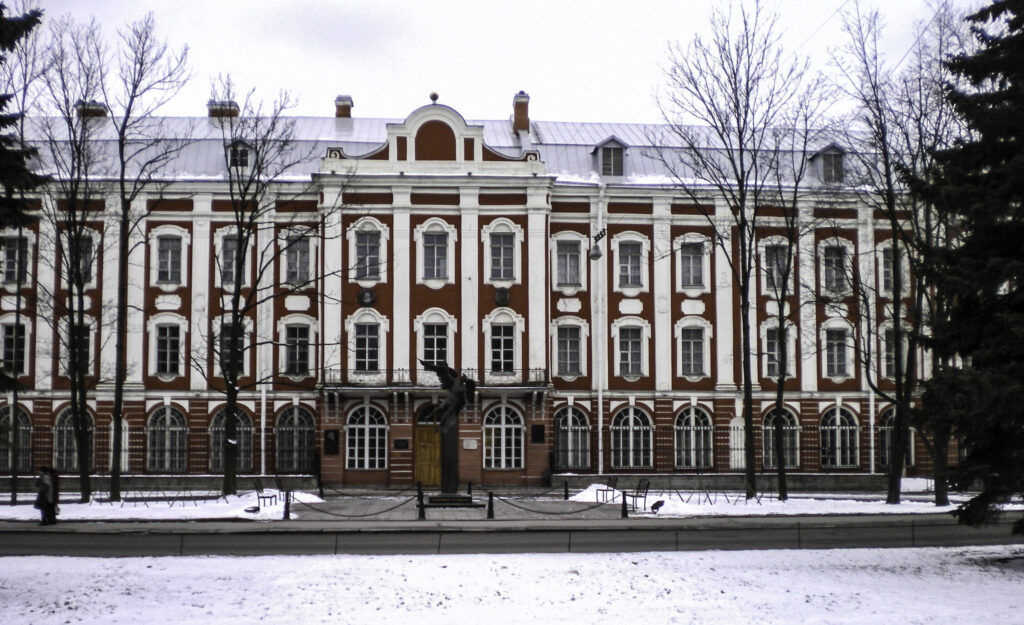
3. Bashkir State Medical University
Location: Ufa, Russia
Established in 1932
Key Features & Academic Excellence
- Top 10 medical universities in Russia
- WHO and NMC recognized
- English-medium instruction
- 95%+ success rate in international medical licensing exams
- 6-year MBBS program
- 700+ experienced professors
- 150+ doctorate degree holders
- International teaching staff
- Regular faculty development workshops
- Specialized medical experts
Overview: Bashkir State Medical University (BSMU) stands as a premier medical institution in Russia, offering comprehensive medical education with a perfect blend of traditional knowledge and modern medical practices. Its strong infrastructure, experienced faculty, and focus on practical training make it an excellent choice for international students pursuing medical education.
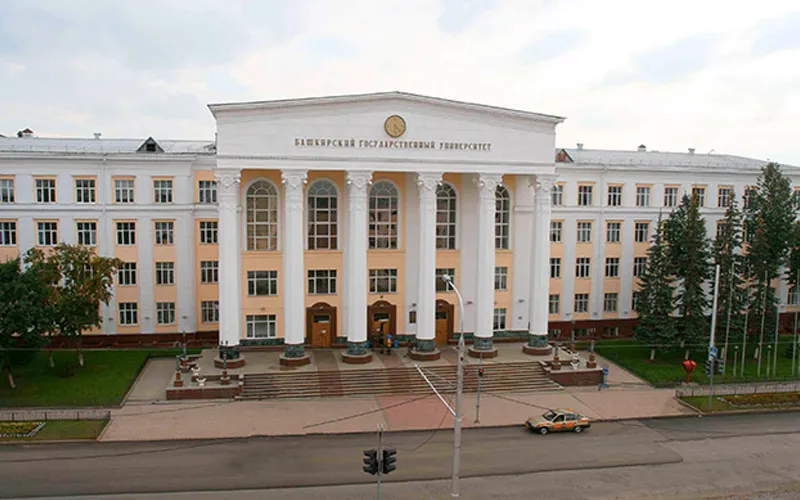
4. Kazan State Medical University (KSMU)
- Location: Kazan, Republic of Tatarstan, Russia
- Established: 1814
Key Features & Academic Excellence
- Ranked among top 5 medical universities in Russia
- WHO and NMC recognized
- English medium instruction
- 97%+ graduate success rate
- 6-year MBBS program
- Globally recognized degree
Faculty & Expertise
- 800+ experienced professors
- 200+ PhD holders
- International faculty members
- Regular faculty development programs
- Expert medical practitioners
- Specialized department heads
Kazan State Medical University (KSMU) is the second oldest university in Kazan and the third oldest medical university in Russia. It is ranked 16th out of 86 universities in Russia and 3rd among Russian medical universities by the European Scientific-Industrial Chamber in 2014. KSMU has about 2700 international students from over 57 countries, half of whom are in the English-medium program. The university has trained over 24,000 students, including many from India.
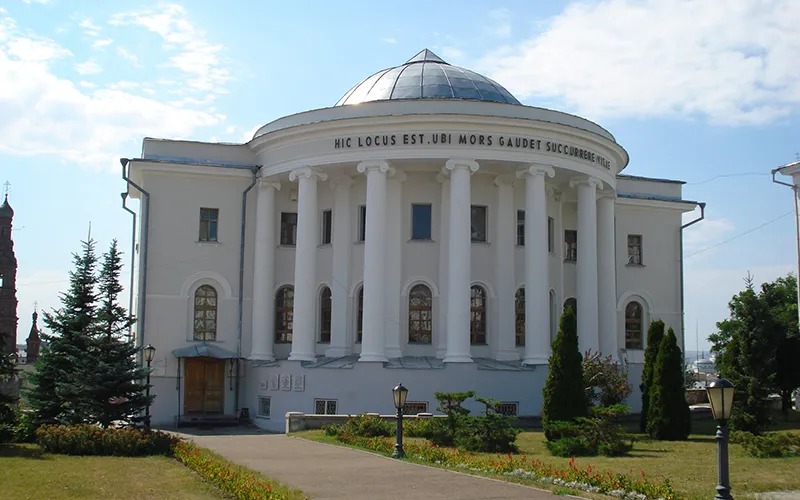
5. Kursk State Medical University (KSMU)
- Location: Kursk, Russia
- Established: 1935
Key Features
- Infrastructure
- Modern lecture halls and classrooms
- Advanced simulation centers
- Well-equipped research laboratories
- Digital library with international journals
- State-of-the-art clinical training facilities
- Clinical Training
- Multiple affiliated teaching hospitals
- Specialized medical centers
- Primary healthcare units
- Emergency care facilities
- Student Support
- Dedicated international student department
- Multilingual support staff
- 24/7 medical assistance
- Career guidance cell
- Cultural integration programs
- Campus Facilities
- Modern hostel accommodation
- Sports complexes
- Cultural centers
- Student cafeteria with international cuisine
- Wi-Fi enabled campus
Academic Excellence
- Recognition & Accreditation
- WHO recognized
- NMC approved
- Listed in World Directory of Medical Schools
- European education standards compliant
KSMU Kursk State Medical University, established in 1935, stands as one of Russia’s premier medical institutions. Located in the historic city of Kursk, the university has built an impressive reputation for medical education excellence, attracting students from over 50 countries worldwide. Its blend of traditional medical education with modern teaching methodologies has made it a preferred choice for international students seeking quality medical education.
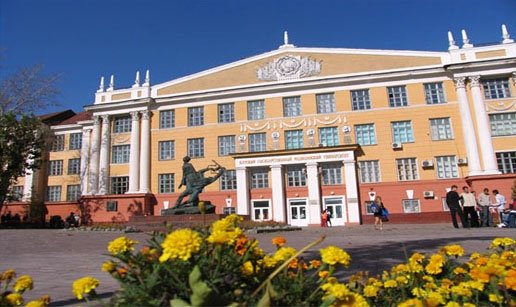
6. Northern State Medical University (NSMU).
- Location: Arkhangelsk, Russia
- Established: 1932
Key Features
- Location Benefits
- Unique exposure to Arctic medicine
- Special focus on northern health issues
- Research opportunities in cold climate medicine
- Experience with region-specific healthcare challenges
- Specialized research laboratories
- Advanced simulation centers
- Digital library facilities
- Climate-controlled campus
- Well-equipped clinical training centers
Northern State Medical University, established in 1932, is located in Arkhangelsk, Russia. As one of the northernmost medical universities globally, NSMU has earned recognition for its quality medical education and unique geographical advantage for studying specific medical conditions related to northern climates. The university combines traditional Russian medical education excellence with modern teaching methodologies, serving students from over 30 countries.
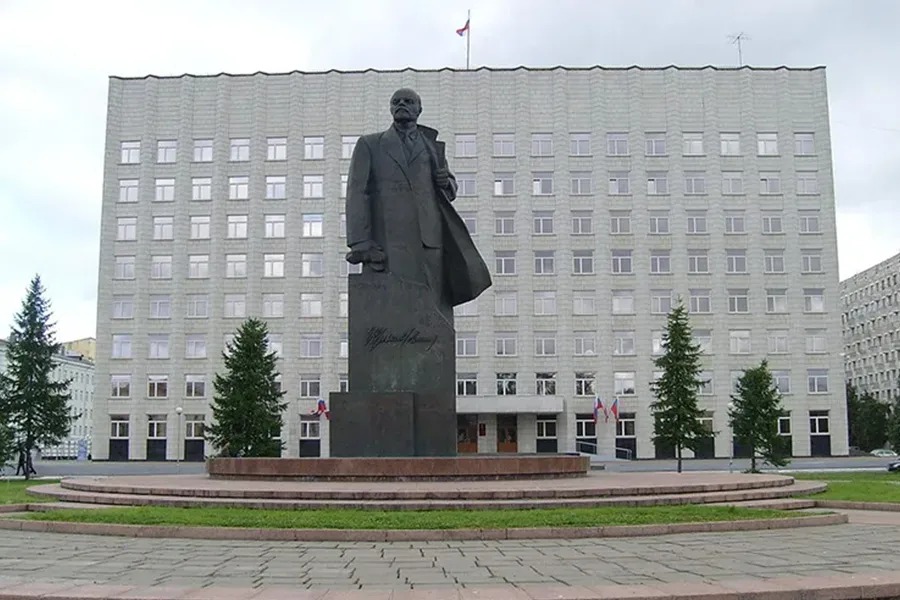
7. Far Eastern Federal University (FEFU)
- Location: Vladivostok, Russia
- Established: 1899
Key Features of Far Eastern Federal University (FEFU):
- 9 schools offering diverse programs
- Student body of 41,000
- International students from 57+ countries
- Modern island campus with advanced facilities
- Partnerships with 240+ global institutions
Far Eastern Federal University is a comprehensive institution with nine schools covering fields from medicine to law. Its diverse student body of 41,000 includes international students from over 57 countries. FEFU’s island campus boasts cutting-edge facilities for learning and research. The university’s global reach extends through partnerships with more than 240 international academic and research institutions, fostering worldwide collaboration.
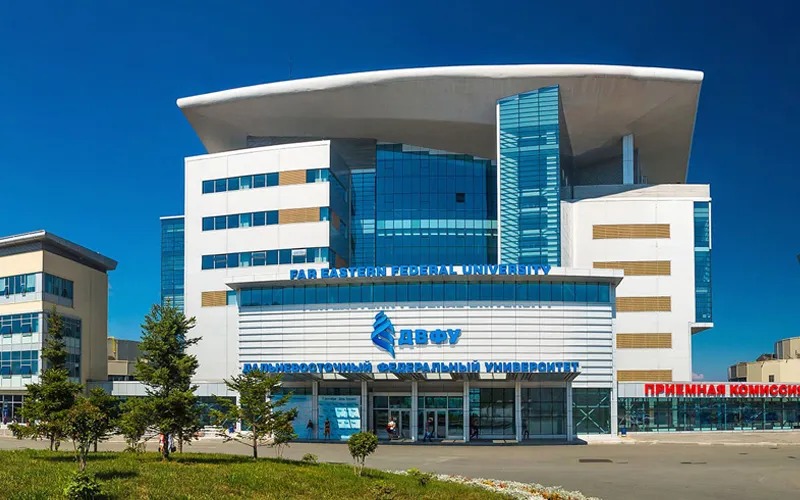
Recognition of Medical Universities
Key Features of Medical University Recognition:
- Accreditation by international bodies (e.g., World Federation for Medical Education, National Medical Commission, Educational Commission for Foreign Medical Graduates, General Medical Council)
- International recognition through global directories (World Directory of Medical Schools, formerly International Medical Education Directory)
- Country-specific regulatory approval (e.g., National Board of Examinations in India, Medical Council of Canada, Australian Medical Council)
- Global reputation based on research, faculty quality, and collaborations
Recognition of medical universities is crucial for global acceptance of their qualifications. Accreditation by bodies like the World Federation for Medical Education and Educational Commission for Foreign Medical Graduates ensures educational standards meet international criteria. Inclusion in the World Directory of Medical Schools enhances global credibility. Country-specific recognition, such as through India’s National Board of Examinations or the Medical Council of Canada, allows graduates to practice in various nations. A university’s reputation, influenced by research output, faculty quality, and international partnerships, further solidifies its standing. These factors collectively determine a medical university’s recognition and the value of its degrees worldwide.
| Organizations | Approved Status |
|---|---|
| NMC | ✔️ |
| WAO | ✔️ |
| WDO | ✔️ |
| Ministry of Education in Russia | ✔️ |
| ECFMG | ✔️ |
| MCC | ✔️ |
Request a Call Back
Learning Structure of MBBS in Russia
Key Features of MBBS Curriculum in Russia:
- Two-phase curriculum structure
- Theory-focused first three years (70% theory, 30% practical)
- Practical-focused final three years (70% clinical, 30% theory)
- Extensive clinical rotations in hospitals
- 1:7 teacher-to-student ratio
The MBBS program in Russia is structured in two distinct phases over six years. The initial three years prioritize theoretical knowledge, with a 70:30 ratio of theory to practical training. The latter three years reverse this emphasis, dedicating 70% of the time to hands-on clinical experience through hospital rotations, where students assist doctors and gain real-world skills. This practical focus, combined with a supportive 1:7 teacher-to-student ratio, ensures graduates are well-prepared for medical practice. The balanced curriculum and emphasis on clinical training make Russian medical universities an attractive option for MBBS studies.
Additional Benefits of Studying MBBS in Russia
Key Features of Studying MBBS in Russia:
- International academic opportunities (conferences, research centers, Erasmus program)
- Government-regulated universities
- Diverse campus life
- Availability of Indian cuisine
- Globally recognized degrees
- Accessible financial aid
- Strong anti-ragging policies
- Simplified admission process
Pursuing an MBBS in Russia offers numerous advantages. Students benefit from international academic exposure through conferences, research centers, and programs like Erasmus. Russian medical universities, strictly regulated by the government, provide a vibrant campus life and globally recognized degrees. The availability of Indian food eases cultural transition for Indian students. Financial support is readily accessible through loans and scholarships. A safe learning environment is ensured by strict anti-ragging laws. Moreover, the admission process is designed to be straightforward and student-friendly. These factors collectively make Russia an attractive destination for MBBS studies, combining quality education with a supportive student experience.
| Key Information | |
|---|---|
| Degree Awarded | MD which is equivalent to MBBS in India. |
| Intake | September |
| Duration | 6 years |
| Eligibility | 50% marks in PCB in your 12th class, NEET Qualified. |
| Medium of teaching | English/Russian |
| Fees | 3,500 to 6,000 per year |
| Living cost | 150 to 200 per month |

Eligibility Criteria
Documents Required
- Birth certificate so that you can prove your age.
- Then you need your 10th and 12th marksheets.
- Certificate of conduct and transfer certificate from your school.
- NEET mark sheet
- A valid passport that does not expire after going there for 18 months. Your passport should be valid for 18 months, even after going there.
- You also need a Student Visa
- Passport-size photo clicked on white background.
- No Objection Certificate for Indian students in MBBS is mandatory.
- HIV test report
Important Points to Note

Exchange Rate Variability

Yearly Fees

Limited Seats
Fee Structure
Language Proficiency

Duration
Additional Documents
- Bank statement.
- Fees Receipt.
- Invitation letter for medical universities in Russia.
- The student also needs to submit the approved document from the Ministry of External Affairs, meaning all your documents should be approved.
- Legal papers from the Embassy of Russia, of course.
- You should also have a health insurance certificate.
- A certificate of travel insurance is also mandatory.
Facilities in Russia for Indian Students.
- Accommodation option
- Medical students in Russia have access to hostels, dormitories, private apartments, room-sharing, and single rooms.
- Furnished Rooms – Hostel rooms in Russia are well equipped with essential amenities.
- WiFi Service throughout the campus
- Hostel Canteen – They give you a mess facility.
- Shared kitchen – you can also use the kitchen for sharing.
- Security measures – Russian universities implement high-security measures for student safety.
Career Opportunities
- You can practice in Russia
- You can practice in India after clearing the NMC screening test
- USMLE Preparation
- NEXT Exam
- UKMLA Test – You can prepare for the United Kingdom Medical Licensing Pass
- PG Programmes
Deadline and Admission Process
| Process | Months |
|---|---|
| Registration | Apr - June |
| 10+2 results | May - June |
| Admission | May - Aug |
| Invitation | July - August |
| Visa | Sept |
| Departure | Sept - Oct |
| Onboarding at University | Sept - Oct |
| Examination | Jan - Feb |
| Classes | Nov - Dec |
Other Expenses
| Cost | Description |
|---|---|
| 250 USD - 300 per year | Insurance |
| 250 USD - 300 per year | Medical Check Up |
| 250 USD - 300 per year | Visa Extension |
| 100 - 130 per month | Mess Cost |
| 800 - 1000 per year approx. | Hostel Fees |
Affordability and Financial Considerations
One of the primary attractions of studying medicine in Russia is the relatively affordable cost of education compared to many Western countries. Russian medical universities often offer competitive tuition fees, making quality medical education accessible to a broader range of international students. This cost-effectiveness extends beyond just tuition, as the overall cost of living in many Russian cities is generally lower than in other popular study destinations. However, students must consider additional expenses such as accommodation, food, health insurance, winter clothing, and travel costs. While the initial investment may be lower, students should prepare a comprehensive budget that accounts for the entire duration of their study, including potential language courses and licensing exam fees for their home countries.
Quality of Education and Academic Standards
Russian medical schools have a long-standing reputation for providing rigorous and comprehensive medical education. Many institutions boast a rich history dating back centuries, with some recognized globally for their contributions to medical science. The curriculum in Russian medical schools is often designed to provide a strong foundation in theoretical knowledge and practical skills. Students typically benefit from extensive clinical exposure, starting from the early years of their program. The teaching methodology often emphasizes hands-on experience, with students getting opportunities to observe and participate in patient care under supervision.
However, it’s important to note that the quality of education can vary between institutions. Prospective students should thoroughly research and consider only universities recognized by the World Health Organization (WHO) and listed in the World Directory of Medical Schools. Additionally, they should look into the programs offered, faculty expertise, research opportunities, and available facilities to ensure they align with their career goals and expectations.
Language Considerations and Cultural Immersion
While many Russian medical schools offer programs in English to cater to international students, proficiency in the Russian language can significantly enhance the educational experience. Even in English-medium programs, clinical rotations often involve interaction with local patients who primarily speak Russian. Therefore, students are typically required to learn Russian as part of their curriculum.
This language requirement, while challenging, offers a unique opportunity for cultural immersion. Learning Russian not only aids in academic and clinical settings but also enriches the overall living experience in Russia. It allows students to better integrate into the local community, understand cultural nuances, and potentially open doors to research or career opportunities within Russia or Russian-speaking regions.
The cultural experience extends beyond language. Studying in Russia exposes students to a rich tapestry of history, art, and traditions. This cross-cultural experience can be invaluable in developing a global perspective, enhancing interpersonal skills, and preparing students for the increasingly multicultural nature of modern healthcare systems.
International Recognition and Licensing Challenges
One of the most critical factors to consider when pursuing an MBBS in Russia is the international recognition of the degree. While many Russian medical universities are well-regarded, graduates often need to fulfill additional requirements to practice in their home countries or other nations. This typically involves passing licensing exams specific to the country where they intend to practice.
For instance, graduates planning to practice in the United States must pass the United States Medical Licensing Examination (USMLE). At the same time, those returning to India must clear the Foreign Medical Graduate Examination (FMGE). Getting the degree recognized and obtaining a license to practice can be lengthy and challenging, requiring additional study and preparation beyond the MBBS curriculum.
Students should thoroughly research the recognition status of their chosen university and program in their home country or intended country of practice. They should also familiarize themselves with the specific requirements for medical licensing in these countries, including any mandatory internships or additional training periods.
Adaptation Challenges and Personal Growth
Studying medicine in Russia presents unique challenges that go beyond academics. Students must adapt to a different educational system, which may have distinct teaching methodologies and assessment styles compared to their home countries. The rigorous nature of medical studies and the need to adapt to a new culture and language can be stressful.
The Russian climate, mainly the long, cold winters in many regions, can be a significant adjustment for students from warmer climates. This environmental change can impact physical and mental well-being, requiring students to develop resilience and adaptability.
However, these challenges also present opportunities for personal growth. Successfully navigating these hurdles can lead to increased self-reliance, improved problem-solving skills, and greater cultural competence – all valuable attributes for future medical professionals in diverse healthcare environments.
Career Prospects and Global Opportunities
An MBBS degree from a reputable Russian university can open various career paths within Russia and internationally. Graduates may pursue further specialization, engage in medical research, or enter clinical practice. The international exposure gained during their studies can be particularly advantageous in an increasingly globalized healthcare sector.
However, it’s important to note that graduates may face competition in the job market, particularly when returning to their home countries. The perception of foreign medical degrees can vary; in some cases, additional steps may be required to establish credibility. Networking, gaining relevant experience through internships or research projects, and staying updated with medical advancements in their home countries can help graduates navigate these challenges.
Some graduates find opportunities in international healthcare organizations, medical research institutions, or countries facing a shortage of medical professionals. The ability to speak Russian and their medical training can also open unique opportunities in Russian-speaking regions or organizations dealing with these areas.
Research Opportunities and Technological Exposure
Many Russian medical universities have vital research programs and advanced facilities, providing opportunities for students interested in medical research. Engaging in research projects can enhance critical thinking skills, contribute to scientific knowledge, and potentially lead to publications – all of which can be valuable for future career prospects.
Additionally, exposure to the Russian healthcare system and medical technologies can provide a different healthcare delivery and management perspective. This diverse exposure can be beneficial in developing a well-rounded approach to medical practice and healthcare systems analysis.
Conclusion
Pursuing an MBBS in Russia offers a unique blend of affordability, quality education, and cultural experience. It presents an opportunity to gain a globally recognized medical degree while developing a diverse skill set that is valuable in the international healthcare landscape. However, this path also comes with significant challenges, including language barriers, adaptation to a new environment, and potential hurdles in licensing and recognition.
Prospective students should approach this decision with thorough research and carefully considering their long-term career goals. They should weigh the financial benefits against the potential degree recognition and licensing challenges. It’s advisable to speak with alums, consult with education counselors, and even visit the universities of interest.
Ultimately, success in this endeavor depends on the quality of education received and the student’s dedication, adaptability, and willingness to embrace new experiences. For those who are well-prepared and motivated, studying MBBS in Russia can be a transformative experience, offering a medical degree and a unique global perspective that can be invaluable in their future medical careers.

